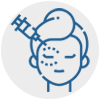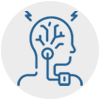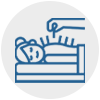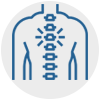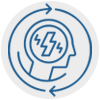Explore this page:

Nerve Block Treatment for Headaches and Migraines
Chronic headaches and migraines can be effectively treated with nerve block injections at the Headache, Migraine & Concussion Centre. These injections can reduce the frequency and severity of migraines, cluster and tension headaches, and can also be used to treat pain symptoms of related health conditions.
What is a nerve block?
A nerve block injection is a minimally invasive medical procedure which combines the use of anti-inflammatory medications with local anesthetics to prevent or manage different types of pain. When injected near a nerve, the nerve block prevents the release of chemicals that send pain signals to the brain. Common uses for therapeutic nerve blocks include chronic headaches, migraines and occipital neuralgia, facial pain such as trigeminal neuralgia, low back pain, and chronic regional pain syndrome (CRPS).
What is the occipital nerve?
The greater occipital nerve and the lesser occipital nerve are spinal nerves which arise between the first and second cervical vertebrae and innervate different areas of the scalp. Disorders of the greater occipital nerve (and in more cases, of the lesser occipital nerve) can cause a type of headache called cervicogenic headache, also referred to as occipital neuralgia.
This type of pain often starts at the base of the skull and can spread to the area behind the eyes, as well as to to the back, front and side of the head. Performing a nerve block of the occipital nerve can be an effective treatment in reducing headache pain felt at the front of the head.
How is the occipital nerve block performed?
This minimally invasive treatment is effective for headaches associated with the occipital nerve. This includes pain that starts at the base of the skull and spreads to the rest of the head. In turn, blocking the occipital nerve prevents the transmission of pain signals to the brain, which prevents or reduces the headache pain.
This safe and effective procedure takes only a few minutes and can be done in our office. The nerve block injection is done using a very fine needle placed near the occipital nerve. The medication used in the procedure both prevents pain signals from reaching the brain and reduces uncomfortable inflammation.
After the injection, it can take up to two weeks to feel the full pain-relieving effect of the medication, which can last for several months before another treatment is needed. However, the duration of this effect can vary among individuals.
Are there any side effects from the procedure?
Nerve blocks are safe for most individuals. However, like most medical procedures, nerve block procedures can result in side effects. Some of the most common side effects of the occipital nerve block procedure include pain at the injection site and numbness on one side of the face. Some other reported side effects include tenderness, bleeding and bruising at the injection site, as well as weakness and/or dizziness. However, these side effects are temporary, typically lasting from 6-8 hours, and should completely disappear with time.
Read more about nerve block injection for chronic pain, here.
What conditions can be treated with occipital nerve block?
An occipital nerve block is effective for treating chronic pain that does not respond to other types of treatments. Typically, headaches that result in throbbing, burning, or radiating pain can be effectively treated with this procedure. Indications for occipital nerve block include both chronic and episodic migraines, chronic and episodic cluster headaches, tension headaches, and occipital neuralgia and cervicogenic headaches.
Migraine headaches
Migraine headaches are a complex headache disorder involving moderate to severe headaches that last between 4 to 72 hours. Migraine headaches usually occur on one side of the head, sometimes with visual or sensory symptoms called “aura.” According to the World Health Organization (WHO), up to 15% of the world’s population suffers from recurrent migraines.
Cluster headaches
Cluster headaches are one of the most painful types of headache and arise due to a neurological disorder. This type of headaches are severe in intensity and typically affect one side of the head, and occur around the eye. Cluster headaches are usually brief (lasting from 15 minutes to up to several hours) and frequently recurring headaches (every day, or sometimes even several times a day), and can last for weeks or even months. These are often mistaken for seasonal allergy symptoms because they tend to occur in the spring and fall.
Tension headaches
Tension headaches develop because of contracted muscles in the head and neck, caused by stress, anxiety, or depression. This is the most common type of headache among adults, and they can last anywhere from half an hour to several days. The pain is often described as a squeezing sensation or constant pressure and affects the forehead and/or the back of the head on both sides.
A nerve block is sometimes used to diagnose and treat other health conditions, including occipital neuralgia, a throbbing or stabbing head and neck pain caused by damage to the occipital nerve. Occipital neuralgia may result from head or neck trauma, repetitive neck movement, and other health issues.
Cervicogenic headaches
Cervicogenic headaches are caused by an underlying injury or disease affecting the cervical spine, which is the upper region of the neck. Individuals who have these headaches often experience reduced range of motion, worsening pain with certain movements, pain that radiates from the back of the neck to the eyes and forehead, and/or pain on just one side of the head.
If you have chronic moderate to severe headache pain that has not responded to treatments such as medication or lifestyle changes, you may benefit from an occipital nerve block. Contact our staff at Headache, Migraine & Concussion Centre at 905-477-4677 for an evaluation.



